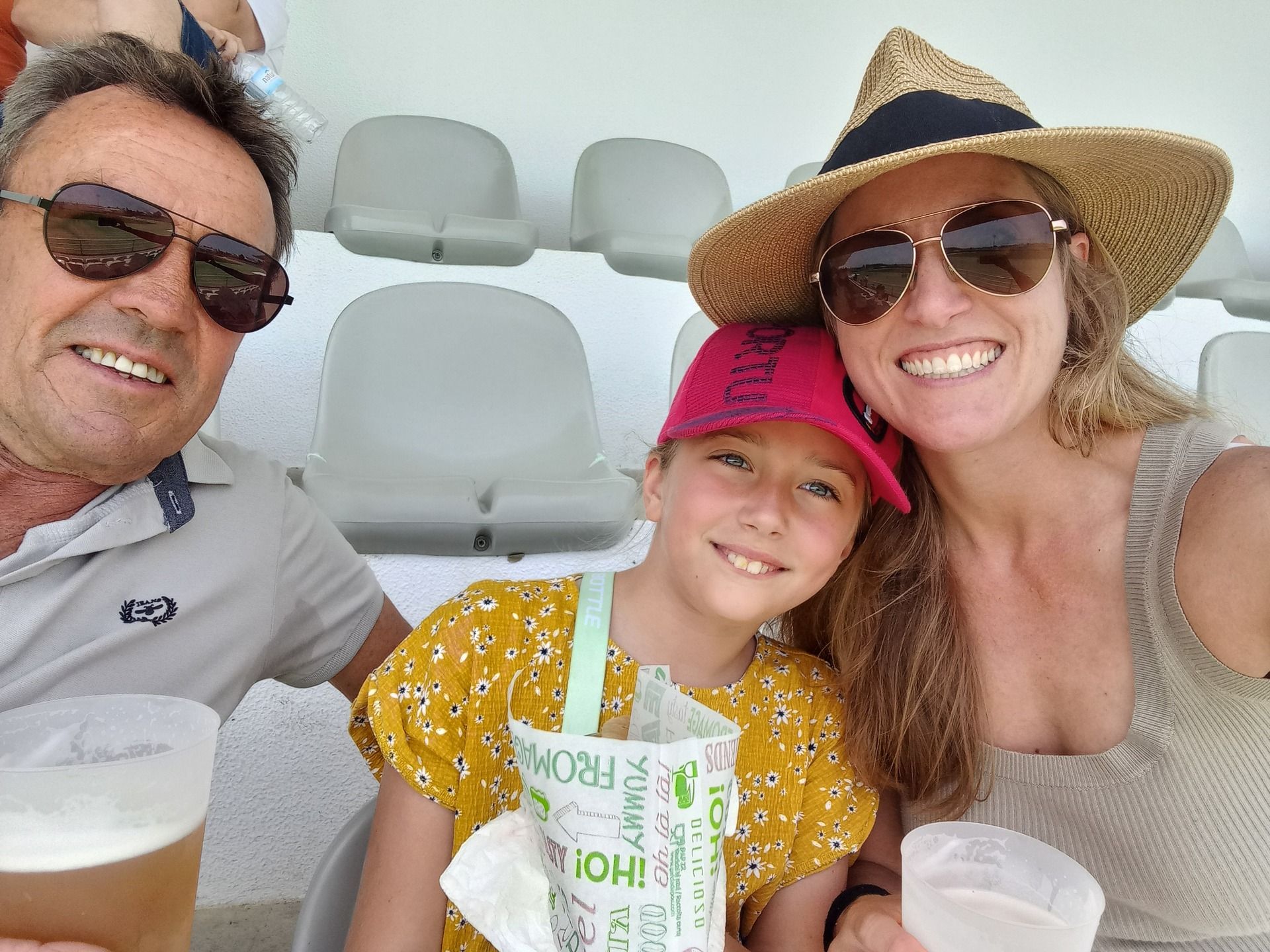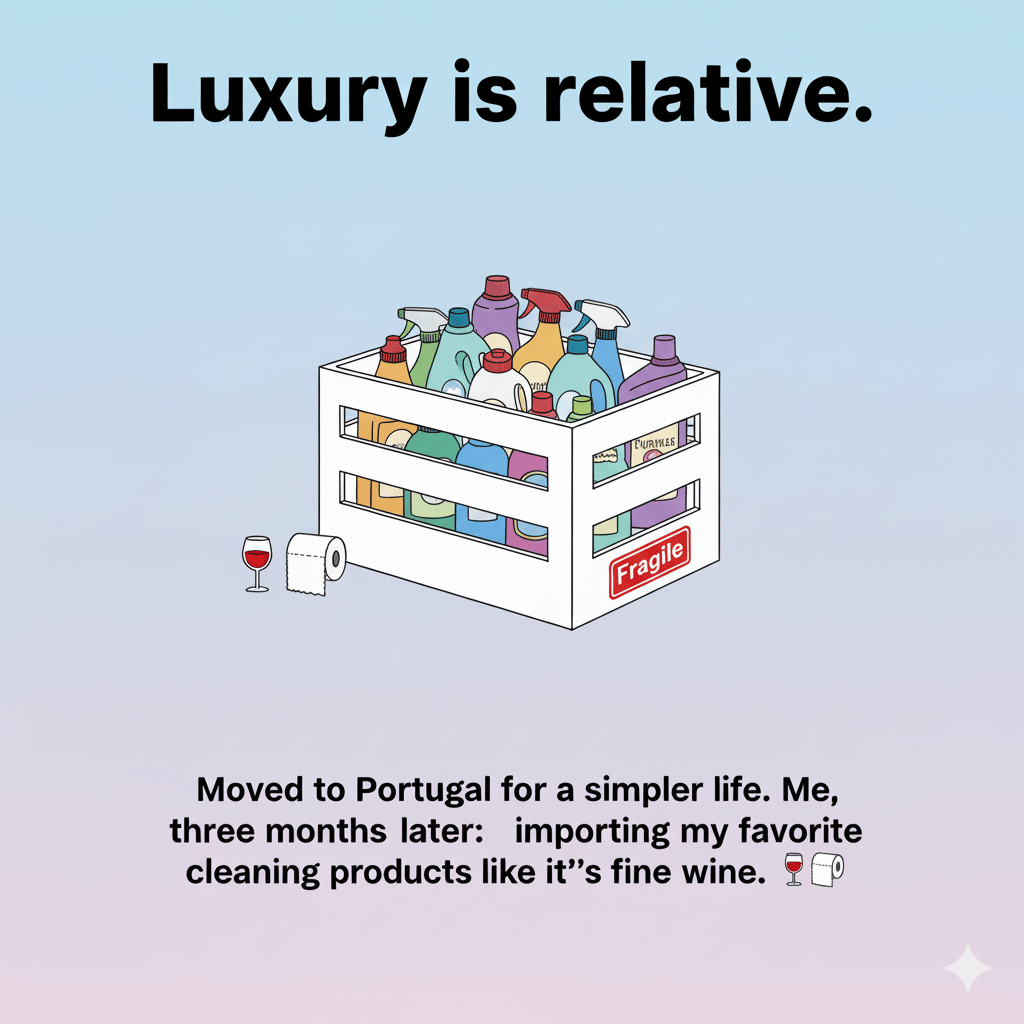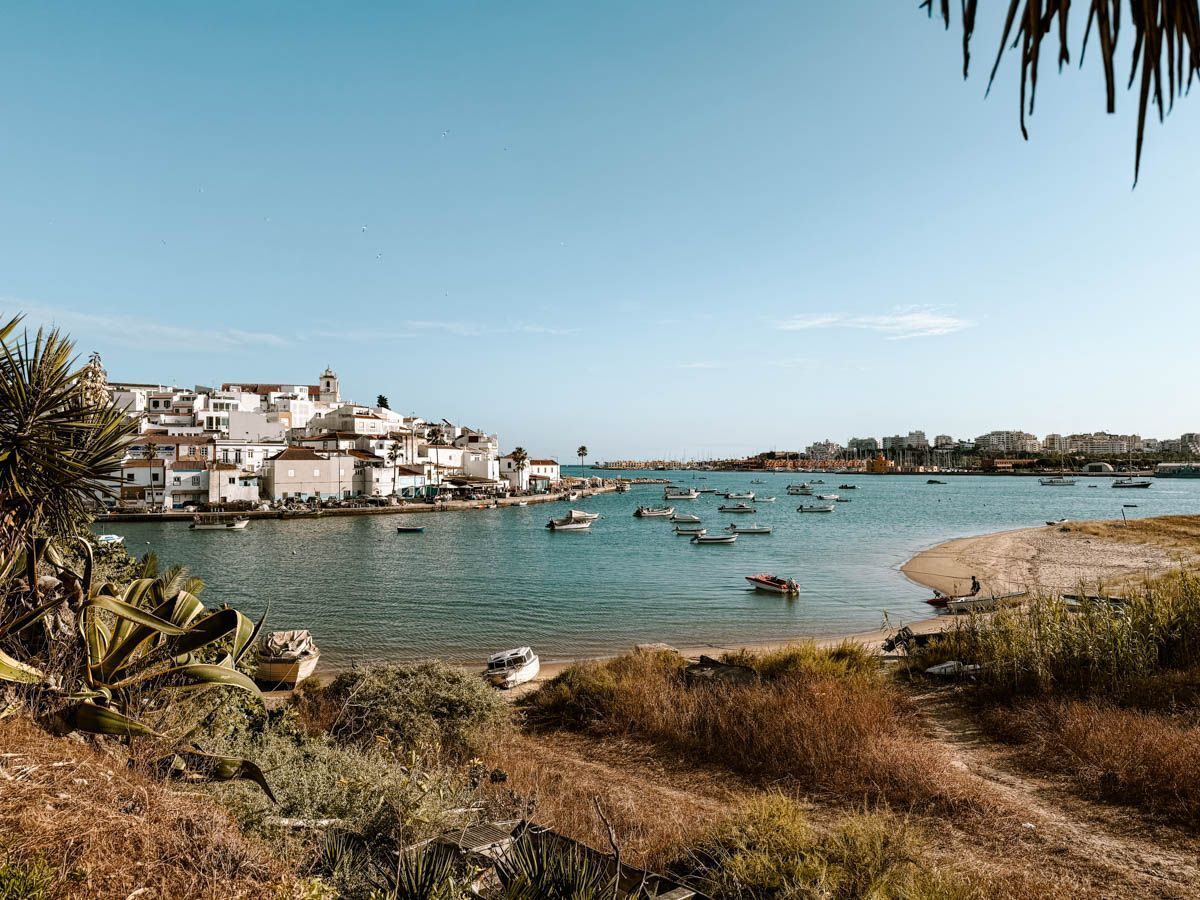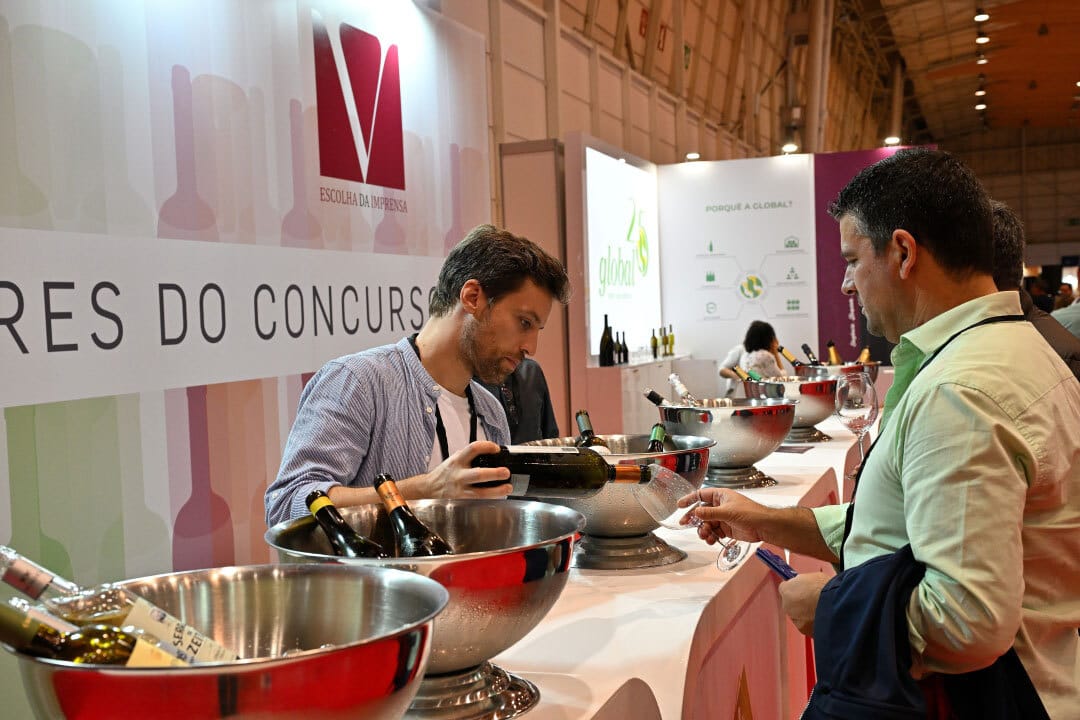Happy Sunday, beautiful people! 🌞
This week marks four years since my family and I landed in Portugal 🎉
We were wide-eyed, hopeful, and completely unaware of what lay ahead. If you caught my post on social media, you’ll know it’s been a mix of highs, lows, and “what on earth is happening?” moments.
Of all the challenges we’ve faced (the paperwork, the schooling, the never-ending bureaucracy), the hardest by far was navigating Portugal’s healthcare system during my husband’s first medical emergency. Nothing prepares you for the panic of not knowing where to go, who to call, or how to get help when every second counts. Add a language barrier, a financial strain, and sheer exhaustion… and I honestly came THIS close to packing up and going home.
That’s why I’m genuinely excited about this week’s main feature: an interview with Serenity Portugal, a medical concierge service founded by Dr. Michael Averbukh and Rita Matias to help expats like us navigate healthcare with confidence. After everything we’ve learned the hard way, I can tell you this: the healthcare system in Portugal is not something you want to DIY alone. Especially if you have medical needs that go beyond an over-the-counter pharmacy visit.
So, what’s on the menu this week:
🩺 How to navigate healthcare in Portugal — with insights from Serenity Portugal
📅 Events to add to your calendar this October
🗣 Our first mini language lesson from Mia Esmeriz (who’s officially taken the reins of Lost in Lingo!)
…and more!
Let’s dive in, shall we?

4 Years in Portugal!
TODAY’S SPONSOR 🫶
Receive Honest News Today
Join over 4 million Americans who start their day with 1440 – your daily digest for unbiased, fact-centric news. From politics to sports, we cover it all by analyzing over 100 sources. Our concise, 5-minute read lands in your inbox each morning at no cost. Experience news without the noise; let 1440 help you make up your own mind. Sign up now and invite your friends and family to be part of the informed.
📷 Pic of the week
Ferragudo is a picturesque fishing village in the Algarve, renowned for its whitewashed cottages, colorful cobbled streets, and warm riverside setting along the mouth of the Arade River. Dating back to the 14th century, it charms visitors with its blend of heritage, like the 16th-century Igreja de Nossa Senhora da Conceição and the 15th-century Castle of São João de Arade, and the laid-back pace of life centered on the main square, cozy eateries, and traditional boats bobbing in the harbor. With its golden beaches, authentic seafood restaurants, and genuine sense of community, Ferragudo is a standout Algarve destination that beautifully preserves its tranquil, inviting spirit.
📰 What’s Happening
Food & Wine
Vinhos & Sabores, Lisbon: October 18–20, 2025. Major wine exhibition in Lisbon with tasting workshops and gourmet food at Feira Internacional de Lisboa.
Festival Nacional de Gastronomia, Santarém: October 16–26, 2025. Showcase of regional Portuguese cuisines, food stalls, demonstrations, and wine tastings.
National Sweets Fair, Abrantes: October 25–27, 2025. Traditional sweets, local honey, jams, and liqueurs.
Music
Counting Crows: Performing live at Lisbon's Coliseu dos Recreios on October 17, 2025, as part of their "The Complete Sweets!" tour.
Boney M: The legendary group will deliver a disco-filled performance at Lisbon’s LX Factory on October 18, 2025, promising a night of classic hits and energetic stage presence.
The Phantom of the Opera (14–25 October, Lisbon): World-renowned musical at Campo Pequeno.
Fun, Family & Themed Events
Feira de Santa Iria (Tomar, October 17–26): Longstanding fair with parades, markets, and concerts in a historical town.
Feira de São Simão: October 26-November 1, Alcobaça. Traditional autumn fair with folk dancing, chestnuts, walnuts, cornbread, and seasonal foods.
Major Motorsport Events
Algarve Classic Festival (Portimão, 25-26 October): Portugal’s biggest classic car race weekend at the international speed circuit.
European Le Mans Series – 4 Horas de Portimão: Oct 17–18, Circuito Internacional do Algarve, Portimão. International endurance race event.
🏡 Lifestyle: The Great Portugal Expat Experience Project
Welcome to Week 4 of The Great Portugal Expat Experience Project:
The Comfort Zone Package 🎁
Over the next few weeks, we’re running short, 2-minute surveys exploring a different slice of expat life in Portugal each time.
Each week, we’ll tease one juicy finding from the previous survey, but the full results will be unveiled at the end of this series in our very own Expat Hustle Newcomer’s Guide, created by this awesome community. Don’t miss your chance to be part of it!
A quick overview of surveys open and coming up:
Week 5: Tech and connectivity challenges
Week 6: Health and wellness transitions
Week 7: Cultural integration helpers
Week 8: The ultimate arrival package design
✨ Fun fact from Week 3’s “Learning Curve” survey: one of the most confusing things for newcomers wasn’t just the language or the bureaucracy… it was figuring out how to use the ATM machines! 💸 (And yes, the survey is still open if you missed it!)
This week, we’re shifting gears from confusion to comfort ✨
Because while Portugal might give us sunshine and €1 espresso, sometimes all you want is your favorite snack, your brand of shampoo, or that one candle scent that smells like home.
Take our quick 2-minute survey to help us crowdsource The Comfort Zone Package: the little luxuries, rituals, and cozy habits that make expat life in Portugal truly feel like home.
You absolute legend! 🙌 Thanks for sharing what makes Portugal feel like home.
Now go light that favorite candle, make your comfort snack, and bask in your perfectly curated expat life (you’ve earned it).
👨⚕ Health & Wellbeing
My family is no stranger to medical emergencies in Portugal, having had our latest scare just over a week ago. I was lucky that my husband's records were already in the system, that the hospital was the same facility that performed his previous VP shunt surgery, and that I didn't have to navigate three different hospitals to get there (as happened the first time!). What I wouldn't have given for someone who knew the landscape during our first emergency two years ago, someone who not only knew where to go for the specific emergency but who to call, and could do it all in Portuguese!
Our first emergency left me at the mercy of many non-English-speaking nurses and staff whose responses ranged from head shakes to vague pointing, and the information I did receive felt very lost in translation. You may never experience this, and I sincerely hope you don't, but we didn't expect it either… although we should have. We should have anticipated that, should anything go wrong with my husband's existing VP shunt, we would know what to do, who to turn to, and where to go. But we didn't plan ahead, and this nearly cost him his life.
Luckily, we survived—twice!—and I'm here to tell the story and urge you not to leave your health as an afterthought when you move, especially if you have any conditions, concerns, or treatments that require more than a pharmacy visit. Things here don't work the same, and not understanding the difference, and not preparing for it, can cause severe and unnecessary stress.
After I initially had a call with Dr. Michael Averbukh, I knew I'd found something I wished I had earlier: expertise and care where we needed it most. I couldn't be more thrilled about this collaboration with Dr. Averbukh and Serenity Portugal, especially given the wealth of information they're so eager to share with bright-eyed expats ready to move to their paradise home.
Today's article is an introduction and your essential guide to understanding the healthcare landscape in Portugal. Without further ado, let's hand things over to Dr. Averbukh in this Q&A-style interview.
Understanding Portugal's Healthcare System
Q: What's the number one thing you wish every expat knew about healthcare in Portugal?
A: There are two “number one’s”.
The first is – “It’s Gonna Be OK!”
During the last 5 years, we have assisted more than 5000 people with their health-related transition to Portugal. Only in one single case, the adaptation to the Portuguese system did not work out. And it wasn’t because of the local inability but rather because of a (respected) unwillingness of the client to change his treatment routine.
The second one – “…and yet, it is VERY different”. Hence, be open-minded, patient, and respectful of the local rules, regulations, culture, and working routines.
Q: How does the public vs. private healthcare system work in Portugal, and when should expats use each?
A: These two systems co‑exist and the common user will benefit from both, alternating between the two according to needs, availability, and costs. We need to remember that the public system, although almost free of financial charges, is very limited when it comes to routine usage of the same. The true benefits of the public system are the affordability of prescription medications and the high-quality, free-of-charge treatment of very serious or life‑threatening medical conditions.
The private system would be widely used for our non‑urgent, routine needs and elective treatments. The main advantages of the private health sector are the accessibility, high quality of care, and relative affordability when compared to other European countries and, for sure, compared to the USA.
Q: What are the most common healthcare mistakes you see new expats make in their first 6 months?
A:
disregarding the need for early planning (of medicinal treatment, continuum of specific treatment, and follow-up)
sticking to the wrong perception of “everything is free of charge or very cheap”. It is likely to be the case, but not immediately, and not everything.
seeking advice and guidance on social media and expats’ forums. It’s YOUR medical needs and conditions. Crowd’s wisdom doesn’t work here.
buying medical insurance without understanding what exactly you are buying. The fact that you have a policy now doesn’t really mean it will serve your specific needs.
Q: What's realistic to expect for wait times for specialists and non‑emergency procedures?
A: Public system – long months; Private – days to a few weeks. Naturally, the “stars” will be less available.
Preparing for Your Move
Q: What steps should people take before moving to ensure continuity of care for chronic conditions or ongoing treatments?
A: It entirely depends on the medical condition. If to give only one advice – PLAN. Search for a reliable (!!) and professional (!!) source of knowledge and information. Ask specific questions that are of your personal concern and focus.
Q: How should expats handle prescriptions, medical records, and specialist referrals when relocating?
A: A question that varies according to specific situations. The one common advice – don’t bother bringing / downloading / printing the whole medical file. Portugal doesn’t have a platform to host this information. Consult a medical professional to determine which parts of your medical history are relevant and bring only these in the specific needed formats.
Q: Are there particular vaccinations or medical checks you recommend expats complete before coming to Portugal?
A: No vaccinations are needed, as Portugal isn’t considered as an endemic area for infectious diseases. Having your check‑ups prior to arrival is a wise thing to do. You will be busy and overwhelmed with the relocation process itself. If possible, check the box on the medical exams if they’re due.
When to Seek Professional Help
Q: What warning signs should prompt an expat to seek professional healthcare navigation help?
A: My perception is quite simple – if you’re having something you perceive as a warning sign, you’re too late. Avoid stress / red flags / drama. Plan, understand what you’re about to face, be prepared for the easy or the harsh journey.
Q: When is it worth paying for private care vs. using the public system?
A: Every time you want to manage the treatment according to your availability, geographical or personal preference, and of course, as long as you can afford the cost.
Q: In simple terms, what does a medical concierge service like Serenity do that expats can't do on their own?
A: I’ll try to explain with an everyday example -
Imagine you arrive in a new country as a tourist. You know there’s this great place/tourist spot you want to visit. You have a comfortable rental car, the weather is great. You just don’t speak the language, and you don’t have a map or any navigation app.
Will you get to your destination ? If you are determined, you will. It will take you much more time, many errors and wrong turns, much more fuel, and probably quite some nerve‑wracking moments.
Now take it to treating your medical needs. In a foreign country, in a different language, without knowing where or how to get to the right physician. Would you take the risk every time ?
Serenity is your “Google Maps” or “Waze” combined with a very smart, professional, trained AI-based tour guide.
Q: How is a service like Serenity different from an insurance provider or a broker?
A: Absolutely non-comparable services. We work in almost an intimate proximity with our members, knowing their background, needs, and preferences, guiding them through the maze of the largest or the smallest health system / provider. Without any disrespect, the insurance provider is one’s payer for medical services, and a broker is the technical representative of the latter. These are important, but are not able to address or attend to your need for clinical assistance, constant availability, personal acquaintance, and accountability.
Q: Can you share an example (anonymized) of how professional navigation helped an expat through a tricky healthcare situation?
A: There are countless examples. But I’ll give one of the simplest, without a “super‑hero” story.
A new (at the time of the event) client of ours arrived in Portugal 4 days ago, solo. Lives in a small town. It’s Saturday night, 5 pm.
The woman, in her 60s, is pretty sick with the flu she probably caught on one of the flights over to Portugal. Fever, cough, chest pain, the whole “package”.
She calls her nurse case manager in Serenity. It obviously isn’t an “ER drama event”, on one hand, but on the other hand, the worst possible experience when you are alone, miserable, helpless…
The nurse gets that. She knows that there is only one good clinic, and where the doctor speaks English in this small town. It closes at 6 pm. She gives them a call, saying that she’s sending a sick woman who needs to be seen, no matter what, before they close for the weekend. The next call is to the client – “they are waiting for you at the clinic. Do you have a way to get there..?”
“…nope” is the answer. Taxi or Uber will arrive in 30‑40 minutes. It’s a remote, sleepy place. “…but my neighbour has a car, although she’s older than I am,” says the sick client, “and hardly speaks English. We communicate mainly with sign language”.
Long story short – our nurse asks the client to knock on the door of the neighbour and hand her the phone. 15 minutes later, the Portuguese 72-year-old neighbour is driving her new American friend to the clinic. She never heard of this place (she goes to the community health centre when needed), so the two ladies hold the phone with the speaker on, and our nurse, looking into Google Maps on her computer in the office, gives directions to the two, making their way to the clinic. Suriel, isn’t it ?
As said, not exactly a TV blockbuster, but imagine yourselves in the same situation, alone. What do you do ?
About Serenity Portugal
Founded by Dr. Michael Averbukh and Rita Matias, Serenity Portugal helps expats navigate the country’s complex healthcare system with confidence. Together, Dr. Averbukh — a physician and former hospital manager — and his partner Rita built Serenity to offer concierge-style support and clinical case management. Their team of nurse case managers connects you with the right doctors, schedules appointments, and acts as your advocate, making sure nothing gets lost in translation. Simply put, Serenity is the trusted driver helping expats steer through Portugal’s healthcare maze.
🩺
With thanks to our collaborator, Dr. Michael Averbukh and the team at Serenity Portugal, for sharing their expertise and insights into navigating the healthcare system in Portugal.
For more information or to learn how Serenity Portugal can support your healthcare journey in Portugal, reach out using the details below.
📞 Tel: (+351) 213 571 467
🗣 The Language Corner - Mini Lessons by Mia Esmeriz
How to say “I’m just browsing” in Portuguese 🤔
When you walk into a shop in Portugal, you’ll often hear the assistant ask “Posso ajudar?” (Can I help?). If you don’t want to feel pressured, there’s a very natural Portuguese phrase you can use:
👉 “Estou só a ver, obrigado/-a.”
It literally means “I’m just looking, thank you.” Short, polite, and the exact phrase locals use when they want to look around in peace. Knowing this one makes shopping so much more comfortable.
🗣 Want to learn more phrases like this? Check out Mia’s free Portuguese course “Kickstart Your Portuguese - The Basics”.
💡 Mia from Mia Esmeriz Academy is a Portuguese teacher from Porto with more than 15 years of experience teaching foreigners. She helps expats become fluent in Portuguese in a clear and practical way. Alongside her courses, she also shares free content on Instagram, Facebook, and TikTok.
…And That’s All Folks

Thanks for reading! 💌
Hustle on!
Angelique🧞♀️
Was this newsletter forwarded to you? Don’t miss next week’s scoop by signing up here.
☕ If this newsletter helps you navigate expat life, consider fueling my next research session with a coffee! Click HERE 💟 You ROCK! Thank you!! 💌
Disclaimer: The links I share are for products and services I’ve actually used and recommend. Sometimes, I get to share a referral link, which might throw a little reward my way—but never at your expense. You’ll pay the same price set by the supplier, no sneaky markups. My recommendations are always based on experience, not commissions. Thanks for supporting this newsletter—you rock!
Did you enjoy this week’s newsletter?






